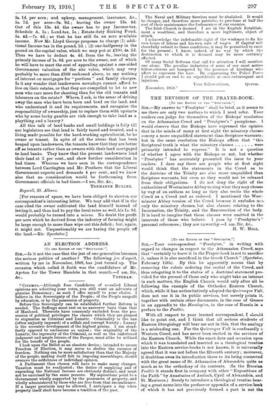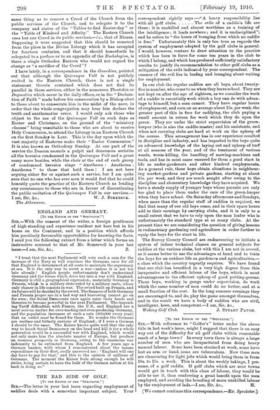[To THE EDITOR OF THE "SPECTATOR. "] Sin,—Your correspondent "Presbyter," in
writing with regard to changes in respect to the Athanasian Creed, says that "certainly. to leave it in the Prayer-book is not to sacrifice it, unless it is also sacrificed in the Greek Church " (Spectator, February 12th). By this he apparently means that by removing the rubric ordering the recital of the Creed, and thus relegating it to the status of a doctrinal statement pro- vided for the perusal of those only who might take an interest in such matters, the English Church would only after all be following the example of the Orthodox Eastern Church, which, while it has authoritatively adopted the Quicunque Vult, does not use it in its public services, but merely prints it, together with certain other documents, in the case of Greece in an appendix to the Horologion, in the case of Russia in a preface to the Psaltir.
With all respect to your learned correspondent, I should like to point out, and I think that all serious students of Eastern liturgiology will bear me out in this, that the analogy is a misleading one. For the Quicunque Vult is confessedly a Western Creed, and has never been recited in the services of the Eastern Church. While the exact date and occasion upon which it was translated and inserted as a theological treatise into the Eastern service-books is not known, it is universally agreed that it was not before the fifteenth century ; moreover, it doubtless owes its introduction there to its being connected with the great name of St. Athanasius of Alexandria quite as much as to the orthodoxy of its contents. (In the Russian Psaltir it stands first in company with other " Expositions of the Faith " by Anastasius of Antioch, Cyril of Alexandria, and St. Maximus.) Surely to introduce a theological treatise bear- ing a great name into the preface or appendix of a service-book of which it has not previously formed a part is not the same thing as to remove a Creed of the Church from the public services of the Church, and to relegate it to the company and status of the " Tables to find Easter-day " or the " Table of Kindred and Affinity." The Eastern Church uses but one Creed in its public services,—i.e., that of Nicaea. Supposing it were suggested that this should be removed from the place in the Divine Liturgy which it has occupied for fourteen centuries, and that it should henceforth be relegated to a preface or to an appendix of the Euchologion, is there a single Orthodox Eastern who would not regard the change as "a sacrifice of the Creed "?
I have lately, in a correspondence in the Guardian, pointed out that although the Quicunque Vult is not publicly recited in the Eastern Church, there is not a single statement therein contained which does not find its parallel in those services, either in the numerous Theotokia or Dogmatica which occur in the daily offices, or in the " Declara- tion of Faith " made before his consecration by a Bishop-elect to those about to consecrate him in the midst of the nave, in order that the whole congregation may hear him declare the truth and anathematise error. I would only ask those who object to the use of the Quicunque Vult on such days as Easter and Christmas, on the ground of the "minatory clauses" being unsuitable to those who are about to receive Holy Communion, to attend the Liturgy in an Eastern Church on the first Sunday in Lent. This is the day upon which the vast majority of Easterns make their " Easter Communion." It is also known as Orthodoxy Sunday. At one part of the service the Deacon ascends a pulpit and denounces seriatim all the heresies condemned in the Quicunque Vult and a great many more besides, while the choir at the end of each group of condemned heresies sings " Anathema : Anathema : Anathema " to those that hold them ! I am not here arguing either for or against such a service, but I am quite sure that no one who has ever seen it would feel that he could honestly quote the practice of the Eastern Church as lending any countenance to those who are in favour of discontinuing the public recitation of the Quicunque Vult in our services.—









































 Previous page
Previous page